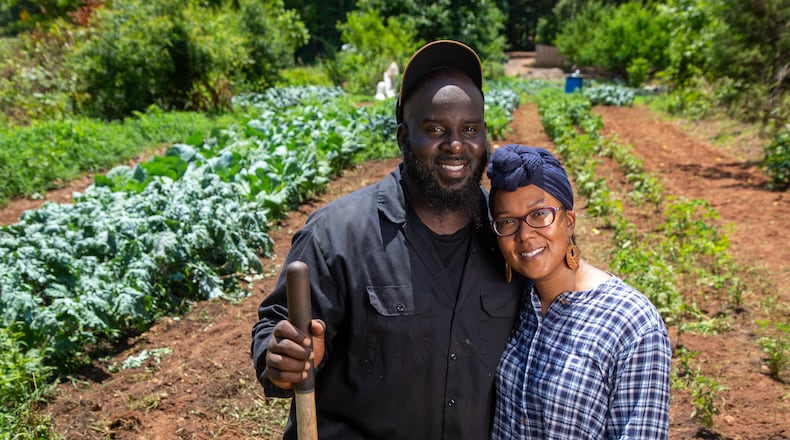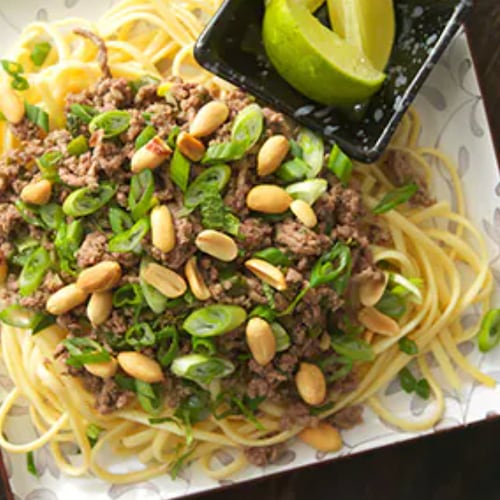Monroe — People had pulled on their gardening gloves and sun visors, and they were just starting to survey rows of weed-choked furrows at Bread and Butter Farms when Musa Hasan called out, “I need to warn you about something. We’ve got needle ants here. They are worse than fire ants. The bites feel like wasp stings and last all day.”
“Good to know,” Warren Cameron said, laughing. There was commotion in the group, and a colony of the small, black ants was identified and left alone. Even pests have their place on an organic farm.
The six people assembled that morning lowered themselves to their knees and began pulling away handfuls of grass and pigweed. Crops began to emerge: Swiss chard and red Russian kale headed for sale at the Peachtree Road Farmers Market, but also milky oats and ashwagandha that Hasan would use for a homemade health tincture.
Credit: Phil Skinner
Credit: Phil Skinner
Joining Hasan and Cameron were Cameron’s wife, Keisha, his partner at High Hog Farm in Gwinnett County; and three representatives from the nonprofit group Southeastern African American Farmers Organic Network (SAAFON), which organizes such farm days throughout the region as a way for Black farmers to develop lateral ties with colleagues, form local kinships and work together on projects. Hasan and his wife, Micole, run the 10-acre vegetable farm alone — maybe with a little help from their four kids, ages 5-12. But, when it comes time to build a chicken coop, to weed, or to plow new rows for planting, they appreciate the help.
“Wow, the deer really decimated this crop,” Hasan said, poking through denuded red, yellow and white chard stems. “Y’all wanna come back and build a fence?”
The conversation turned to animals, wild and domestic, as everyone fell into a rhythm, grabbing handfuls of weeds and dumping them into a wheelbarrow. The weeds eventually would end up in 100-gallon blue plastic barrels, to be brewed into a kind of fertilizing tea and returned to the land.
Credit: Phil Skinner
Credit: Phil Skinner
Keisha Cameron launched into a story about trying to treat a chicken with a fungal infection in its crop. “I looked it up online, and the recommendation is Monistat,” used to treat yeast infections in women.
“It seemed to be working, but I had to keep going back for more,” she said, to building laughter. “And, by the third time I’m back, I tell the person behind the counter, ‘You know, this is for my hen.’ He just looked confused.”
She continued, describing life for the 70 or so well-tended animals she keeps. “My animals are what you might refer to as ‘bougie.’ We’ve got sheep and angora rabbits for shearing, a dairy goat, (and) there’s a wild turkey we’ve taken in.”
Looking for fulfillment
The Camerons, like the Hasans, were urban professionals before turning to farming. Keisha was a full-time graphic designer, while Warren worked in IT.
The Hasans met at Tuskegee University, when Musa tutored Micole in organic chemistry. Their studies led them both to Emory University, where they worked with federal grants and clinical research trials. It was skilled, professional labor, but the farmland, which Musa’s father had purchased 30 years ago, beckoned.
Alsie Parks, SAAFON’s director of field organizing, who was on hand to help weed that day, said this trajectory is not uncommon among the farmers she works with. “For many Black people, there’s such a re-emergence of desire to live on the land and farm,” she noted. “A lot of folks have corporate jobs, and are just not fulfilled. The American dream is not fulfilling. They think, ‘I have this degree, but I’ve watched people in my family get sick from the things they buy at the grocery store.’”
Credit: Phil Skinner
Credit: Phil Skinner
A return to the land, she explained, means being able to raise children with the same core values that once guided their elders and ancestors. “It’s an opportunity to practice self-determination and autonomy.”
Many, such as the Camerons and Hasans, opt for this kind of periurban farming — filling the needs of a city from its rural outskirts. The great majority of the nation’s 45,000 or so Black-owned farms are in the Southeast, and they’re having a cultural moment.
Natalie Baszile, who wrote the farming saga “Queen Sugar,” on which the Ava DuVernay-helmed television series is based, addressed it in her new book, “We Are Each Other’s Harvest: Celebrating African American Farmers, Land and Legacy” (Amistad), an anthology of articles, poems, essays and interviews with farmers, as well as such authors as food historian and memoirist Michael Twitty.
In an interview with KQED radio, Baszile said she did everything to avoid the “woe is me” narrative. “That is part of the story, (but) I was so inspired by the experience of these farmers, and this rich and textured history — it’s an uplifting experience.”
A racist history of loans denied
And, yet, the numbers do tell a story of disenfranchisement and racism. A century ago, there were more than 1 million Black farmers in America, but decades of discriminatory loan practices by local U.S. Department of Agriculture offices led to many farmers falling into debt and having their property seized by the government. Industry was no kinder. Predatory developers waited in prey for Black landowners to die intestate, and then prized the divided family inheritance apart, parcel by parcel, until everyone was forced to sell for far under market value.
These injustices came to a head — or, at least, into public consciousness — in 1999, when a coalition of Black farmers filed and won a class action lawsuit against the USDA (Pigford v. Glickman). The government paid out nearly $1 billion in settlements, yet a third of the claimants failed to collect a dime, and the case did little to slow the failures of many Black-owned farms.
Credit: Phil Skinner
Credit: Phil Skinner
More recently, $4 billion in federal loan forgiveness for Black farmers was built into the American Rescue Plan Act of 2021, but several federal judges have blocked payouts, and the funding remains at a standstill.
The saga continues but, thankfully, not for the Hasans, who own their land outright. Musa’s father, Montaque, was born to a sharecropper and did that work briefly before finding better pay as a heavy equipment operator for a construction company. That allowed him to save up enough money to purchase the plot in 1979 and start farming as a side business. “I remember as a kid helping my Pops fill the truck up with corn, purple hull peas and watermelon, and driving around to different neighborhoods in Monroe and emptying the trucks,” he recalled.
When Musa and Micole began thinking about trading in Microsoft Office Suites for shovels and hoes, they applied for and received a competitive grant from Emory’s Goizueta School of Business, to serve as seed money.
A relationship with the land
While Musa was recounting the story, Micole arrived in the family SUV with their kids, who immediately dispersed. Alayah, the oldest, curious about the adults, shyly waited for introductions. Naeem, the youngest, tore off into the field, free as a bird. Micole surveyed the damage to the crops from a recent deer raid and shook her head. “They even go through the grasses to get my herbs. How do they know to do that?”
Micole also was born one generation removed from farming. Her mother’s family owned hundreds of acres in Alabama’s Black Belt, and her father was a sharecropper nearby. They met, married and joined the Great Migration, ending up in Detroit, where Micole was born. She took advantage of every opportunity to excel in school. But, summer trips to Alabama deeply affected her, and she chose to attend Tuskegee to study biology.
Credit: Phil Skinner
Credit: Phil Skinner
For Micole, re-engaging with the land is a “civic and social thing. What most interests me is the community outreach, the talking to people. It’s my job to educate.”
As the sun rose to its midday height, Musa began collecting armfuls of top bunch collards, their rounded leaves like pingpong paddles, for lunch under a tent. “It’s a good old-timey collard,” he said of the variety, “easy to harvest, with a good flavor.”
He chopped the collards and put them in a pot with rendered beef bacon and tossed them with smoked paprika, salt, pepper and an olive oil he infused with garlic and herbs. He then cooked them on a covered grill, alongside chicken legs and shrimp. Soon, there were grilled peaches and hearty slabs of cornbread, and everyone gathered under the tent, sitting on folding chairs.
“Mmm, these greens,” someone mumbled through that communion-like silence that comes with a good plate of food. They are remarkable — not the sweet, potlikker-heavy greens of an aunt’s famous recipe, but alive-tasting and nourishing.
Nancy Korosi, a neighbor, pulled up in her car to get her weekly Community Supported Agriculture package. Khalilah, the Hasans’ 8-year-old, ran to grab it for her. “Come sit and have a plate,” Musa said, piling one high.
Credit: Phil Skinner
Credit: Phil Skinner
“I can’t, my daughter’s waiting in the car,” she said.
“Then I’m sending this home with you,” Musa responded, wrapping foil over the top.
Keisha Cameron used the break to complete a freelance web project, her laptop tethered to her phone. “Yes, I’m sitting here on a farm doing a job, because I have a mortgage,” she said with a laugh.
No one goes into this work for the easy money, but, for many Black people, it means something special, SAAFON’s Parks said.
“This isn’t about ownership. We feel the land is eager for us to be in a reciprocal relationship,” she said. “Black farming and Black farming culture is a way to honor that symbiotic relationship.”
And, with that, lunch was done; the next weedy row awaited.
For more information about Bread and Butter Farms, visit breadandbutterfarms.com. Find more stories about Georgia farmers and recipes for their products at ajc.com/georgia-on-my-plate.
About the Author
The Latest
Featured








